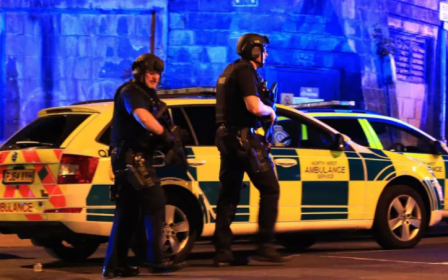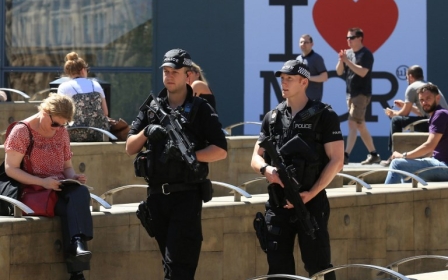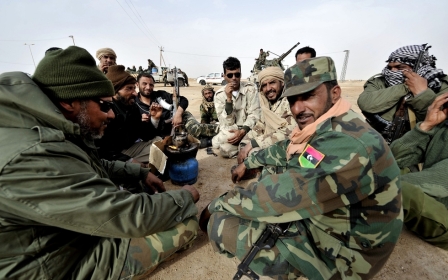UK threat level reduced as police continue arrests connected to Manchester attack

British police said they arrested two more people during raids Saturday over the Manchester concert bombing, as Prime Minister Theresa May announced a reduction in the country's threat level from critical to severe.
The two men, aged 20 and 22, were arrested in North Manchester early Saturday after police gained entry to an address using a controlled explosion, and a bomb disposal team was later involved in a raid in Moss Side, to the south of the city.
The arrests bring to 11 the number of suspects held in Britain over Monday's blast at a concert by US pop idol Ariana Grande, in which 22 people died and 116 were injured and for which the Islamic State group has claimed responsibility.
Police in Libya also detained the father and brother of 22-year-old bomber Salman Abedi.
British police on Saturday said they were raiding an address in Moss Side, with AFP staff reporting that a bomb disposal vehicle was at the scene and that the area was being evacuated.
Mark Rowley, head of Britain's counter-terrorism police, said on Friday that police had captured "a large part of the network" linked to the bombing, in which seven children aged under 18 were among the 22 dead.
"We are very happy we've got our hands around some of the key players that we are concerned about, but there's still a little bit more to do," he said.
More attacks 'highly likely'
Prime Minister May said on Saturday that the terror threat level had been reduced from critical - its highest level - to severe, having been raised in the wake of the attack.
"There are now 11 suspects in custody," she said in a statement. "In the light of the developments, the independent joint terrorism analysis centre has this morning taken the decision to reduce the threat level from critical to severe.
"We should be clear about what this means: A threat level of severe means an attack is highly likely, the country should remain vigilant."
She also announced that Operation Temperer, which involved the deployment of armed forces personnel patrolling alongside police, would wind down after the bank holiday weekend.
"From midnight on Monday, there will be a well-planned and gradual withdrawal of members of the armed forces, who will return to normal duties," she said.
Armed police will be on patrol over the holiday weekend, with security increased at football's showpiece FA Cup final at London's Wembley Stadium on Saturday.
Lancashire County Cricket Club also announced extra security checks for a gig by the Courteeners, an indie rock group, at the Old Trafford cricket ground, where 50,000 are expected at the city's first major gig since the attack.
The bombing was the latest in a series of IS-claimed attacks in Europe that have coincided with an offensive against the militant group in Syria and Iraq by US, British and other Western forces.
Thousands on radar
But as campaigning resumed in Britain for a snap 8 June election following a halt called after Monday's attack, the issue of security, which had not been widely discussed before the attack, was poised to feature highly as polls showed May's poll lead falling sharply.
Opposition Labour leader Jeremy Corbyn said it was the "responsibility" of governments to minimise the risk of terror by giving police the funding they need, after cuts made while May served as interior minister.
The number of police officers fell by 14 percent, or almost 20,000, from 2009 to 2016, according to the independent Institute for Fiscal Studies think tank.
May responded that the Conservative government had "increased the funding for our security and intelligence agencies" and would "continue to provide them with the support they need".
Authorities are currently handling 500 terror-related investigations into 3,000 individuals, and it was revealed Friday that around 20,000 more people are on the intelligence radar as posing a "residual risk".
New MEE newsletter: Jerusalem Dispatch
Sign up to get the latest insights and analysis on Israel-Palestine, alongside Turkey Unpacked and other MEE newsletters
Middle East Eye delivers independent and unrivalled coverage and analysis of the Middle East, North Africa and beyond. To learn more about republishing this content and the associated fees, please fill out this form. More about MEE can be found here.




